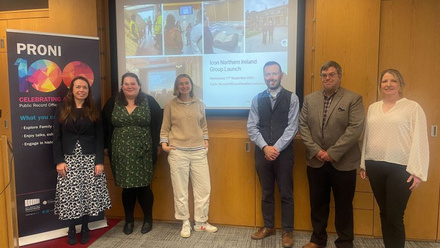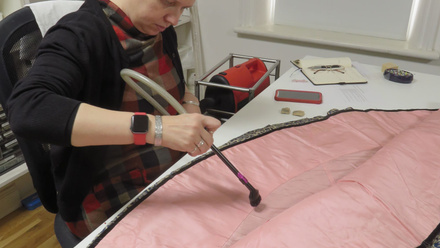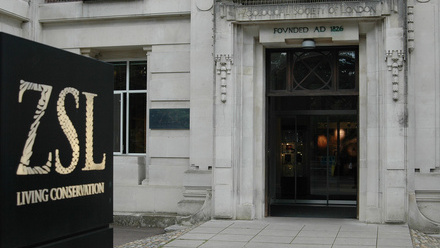Many heritage organisations are implementing special measures to ensure that their collections are secure, safely cared for and maintained during this unprecedented period. The details of what is appropriate and feasible will vary between organisations, but this guidance outlines areas to consider in order to maintain the condition of collections from a conservation perspective. Given the clear risks to health and wellbeing posed to staff, and the need to support the #StayAtHome message, we stress that consevators and others should not undertake work on site without the appropriate permissions, risk assessments and PPE in place.
The UK Heads of Conservation Group has produced the following guidance for museums and other organisations trying to care for their collections during Coronavirus (COVID-19) lockdown period.
Access
Currently the UK is in a period of lockdown. Heritage organisations are secure with onsite security systems and staff in place, however site access for collections staff is necessarily restricted in line with the Covid-19 lockdown and quarantine measures.
Risk assess your collections
With restricted access, it is important to identify the highest areas of risk across your collections to enable you to focus the time and resources you can deploy. The Collections Trust provides a useful guide to undertaking collection risk assessments.
The primary risks to collections are the ten agents of deterioration. In the current lockdown scenario, likely risks include:
- Pest infestation: collections with known pest issues or which are particularly vulnerable to pests
- Poor environment: collections susceptible to fluctuations and extremes of humidity located in areas with poor or limited environmental control
- Dust: organic material on open display or open in storage
- Light: collections exposed to UV or extreme light levels at risk of fading or degrading from light exposure
- Building fabric/features: known building issues including areas prone to water ingress, leaky radiators or historic fireplaces that may introduce water, dust and debris to collection areas
Also consider equipment onsite linked to the care of collections that requires ongoing maintenance. For example, standalone dehumidifiers/humidifiers and freezers holding collections. These may be high-risk if equipment maintenance is reduced during this period.
Focus your resources to manage the risk
When you have identified your high and medium risk collections, focus on identifying methods to manage and reduce the risks. These could include:
- Turning off all lights except for security lighting
- Ensuring food is either removed from site or held in air-tight containers
- Where possible, monitoring collection environments remotely via Building Maintenance Systems (BMS) or other environmental monitoring systems, making changes to air handling unit set points/functions via remote controls if temperature and humidity move outside preferred parameters
- Turning off environmental control systems, either because they are prone to malfunctioning, cannot be maintained, or because with no visitors in the building, adequate conditions can be maintained without using the plant
Scheduled collections care checks
Where possible, a regular check of those collections assessed as high and medium risk is desirable. These checks are ideally undertaken by colleagues trained in collections care with site knowledge who can readily identify issues such as pest activity, mould growth or other changes to the condition of collections. For some organisations, it may be onsite security or other colleagues not trained in collections care who undertake checks. In these instances, an overview of the high and medium risk collections should be provided with details of where to focus checks, what to look for and contact details of trained colleagues offsite to report concerns to or discuss potential issues with.
In all instances, it is important establish a means to record and share the results of collection checks across relevant colleagues. This will enable you to identify changes in collections and reassess risk areas throughout this period to ensure your resources are always effectively deployed.
Emergency plans
The person in organisation who leads on collection emergency planning should consider whether response plans need updating for this unique period. For example:
- Will the plan work if some colleagues are unable to attend site due to the corona virus isolation orders and, if not, can other colleagues be identified as reserves?
- If the plan relies on the use of an external contractor or assistance from a partner organisation, is that service or support still available?
- If the plan assumes that equipment, materials and PPE will be purchased or hired at the point of need, is that still achievable, or do alternative arrangements need to be put in place?
The Museum of London has developed an excellent pocket-salvage guide which may be useful to support this review. Claire Fry ACR and her colleagues at Spencer & Fry have also produced a Collection Care Guidance for Museums and Historic Properties during the Covid-19 Crisis.
Other useful guidance
The UK Heads of Conservation Group is now preparing guidance on how to plan to ‘wake up your collections’ when the Coronavirus outbreak is resolved, and heritage organisations prepare for reopening. In the meantime, the following links signpost you to relevant sector guidance about interim collections care:
Museum of London has an excellent page providing current sector advice and latest news relevant to the Covid-19 outbreak.
AIM has published a detailed page with a lot of useful information and resources on their website.
The Museums Association has created an overview article, looking at how Covid-19 will impact museums and what can be done to mitigate it.
Arts Council England (ACE) have released guidance for NPOs and their other funded programmes regarding the current Covid-19 outbreak.
A range of guidance on broader COVID-19 related issues can be found in the Icon Coronavirus hub.






